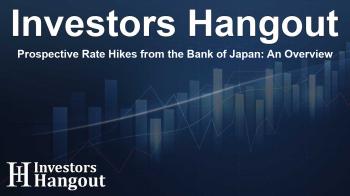Prospective Rate Hikes from the Bank of Japan: An Overview

Understanding the Bank of Japan's Potential Rate Hike
The Bank of Japan (BOJ) is currently navigating a critical juncture in its monetary policy, with growing anticipation surrounding the possibility of a rate hike. Recent economic indicators signal a robust environment that may prompt the BOJ to revise its interest rates as it assesses ongoing economic metrics.
The Meeting Timeline
The BOJ’s committee responsible for setting the monetary policy is in the midst of a significant two-day meeting. As they deliberate, the outcome will be crucial, especially considering the recent economic trends that have emerged.
Current Economic Indicators
The BOJ has previously ended a prolonged period of negative interest rates and has already raised its short-term target rate to 0.25%. This shift indicates a willingness to respond to economic dynamics, particularly as inflation remains above the targeted 2% threshold for several years. These economic changes have created a fertile ground for discussions about further increases in interest rates.
Indicators of Economic Growth
It’s becoming increasingly evident that various economic sectors are contributing to growth. Companies are managing to pass on rising raw material and labor costs to consumers, a sign that inflation may be set to increase. This could correlate with forecasts in the BOJ's quarterly outlook report, where adjustments are anticipated in the inflation outlook.
Wage Negotiations and Their Impact
Upcoming annual wage negotiations are expected to yield significant increases, which could play a pivotal role in the decision-making process for the BOJ. Many companies, reflecting positive economic trends, are preparing to offer wage hikes, fulfilling a vital criterion for potential interest rate increases.
The Insights from BOJ Officials
Opinions from BOJ officials on wage growth and global economic conditions have attracted considerable market attention. The governor and deputy governors have expressed optimism regarding Japan's trajectory towards achieving its inflation targets. That said, they remain vigilant regarding external factors, particularly the implications of international policies.
Global Economic Factors
Recent discussions highlight the focus on U.S. economic policies and their potential ripple effects on Japan’s economy. The BOJ has been observing shifts within the U.S. that could influence market stability, as well as Japan's economic strategy moving forward.
Market Reactions and Expectations
As discussions about a potential rate hike intensify, the markets are responding. Should the BOJ decide to raise rates, it could lead to immediate fluctuations in the Japanese yen. However, the sustainability of such fluctuations would heavily depend on comments from the governor post-meeting regarding further monetary policy direction.
Looking Ahead: Future Projections
The BOJ is set to unveil a quarterly outlook report that will provide insights into its growth and inflation predictions. Observers will be keen to learn how these sentiments influence future interest rate decisions. Particularly noteworthy will be the BOJ’s stance on the neutral rate, which affects their perception of healthy economic conditions.
Future Rate Hikes
Experts have diverse expectations regarding the pace of rate adjustments. A common sentiment is that the BOJ may opt for gradual rate adjustments, potentially increasing rates twice yearly. Such a strategy may help navigate the uncertain political landscape while assessing the effects of broader economic policies.
The Political Context
Lastly, political dynamics could also impact the BOJ’s decision. With an important election on the horizon, prudence in policy shifts may prevail as the BOJ seeks to maintain stability amid changing domestic political conditions.
Frequently Asked Questions
What are the current interest rates set by the BOJ?
The BOJ's current short-term interest rate is 0.25%, raised recently from negative rates.
How has inflation influenced BOJ's policies?
Inflation exceeding the 2% target has been a key factor driving potential rate hikes.
What role do wage negotiations play in rate decisions?
Wage negotiations are critical, as substantial pay increases can trigger interest rate hikes.
How does global economic policy impact Japan?
U.S. economic policies significantly affect Japan's market stability and decision-making at the BOJ.
What is the outlook for future rate adjustments?
Analysts predict the BOJ may increase rates gradually, potentially twice a year, depending on economic conditions.
About Investors Hangout
Investors Hangout is a leading online stock forum for financial discussion and learning, offering a wide range of free tools and resources. It draws in traders of all levels, who exchange market knowledge, investigate trading tactics, and keep an eye on industry developments in real time. Featuring financial articles, stock message boards, quotes, charts, company profiles, and live news updates. Through cooperative learning and a wealth of informational resources, it helps users from novices creating their first portfolios to experts honing their techniques. Join Investors Hangout today: https://investorshangout.com/
Disclaimer: The content of this article is solely for general informational purposes only; it does not represent legal, financial, or investment advice. Investors Hangout does not offer financial advice; the author is not a licensed financial advisor. Consult a qualified advisor before making any financial or investment decisions based on this article. The author's interpretation of publicly available data presented here; as a result, they should not be taken as advice to purchase, sell, or hold any securities mentioned or any other investments. If any of the material offered here is inaccurate, please contact us for corrections.
